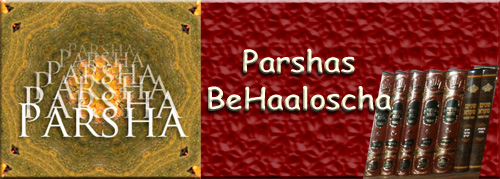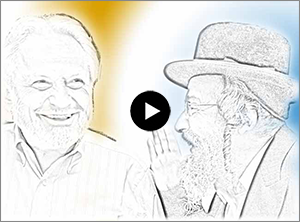Category Archives: Parshat Hashavua
Parshas Beshalach – About The Slav
In the Parshas HaMan, it mentions that G-d will give them basar in the evening, and lechem in the morning. Then in the next posuk it identifies that the basar being referred to is the slav. I imagined that just like they had the Man (the manna) the whole 40 years, they also had the…
Parshat Bo
It came to me this year during the reading of Parshat “Bo el Pharaoh”, an innovative thought that I never considered before. At the beginning of the Parsha, Moshe and Aharon warn Pharaoh about the eighth plague of locusts, they gave the warning, turned around, and walked out. Then Pharaoh’s advisers urged him to reconsider…
Parshat Vayairah – An Important Principle in Mitzva Observance
At the beginning of Parshat Vayairah the Torah relates that three Heavenly angels disguised as simple guests came to Avraham Avinu. Avraham was a master at Hachnosas Orchim (hospitality), and he immediately brought them in and started to quickly prepare for them a meal to eat. The Torah says that Avraham chose a calf and…
Parsha Braisheit
I always wondered, in the third day it says that G-d commanded that the earth should bring forth grasses etc. and fruit trees. Aitz pri oseh pri, Rashi brings from the words of Chazal that Aitz Pri implies that the taste of the tree should be like the taste of the fruit. And that the…
The Akedah – Reconciling Contradictions
At the end of the Parsha Vayaira we find the story of the Akedah. Regarding the Akedah, the Torah recounts that G-d told Avraham to take his son Yitzchak to a place which He will reveal afterwards, and to offer up Yitzchak as a burnt offering to G-d. They journeyed together with Yishmael and Eliezer,…
Parsha Ki Sisa Likutei Shoshanim
Parsha Ki Sisa – Likutei Shoshanim Torah on the Parsha of Ki Sisa from Likutei Shoshanim. (BR: Please see my introduction HERE. Adapted from “Sefer Likutei Shoshanim” by HaAdmor HaRishon Me-Savran (Savaran), HaRav Moshe Tzvi Me-Savran Towards the end of this week’s Parsha the Torah states, “Vayemahair Moshe Vayikod Artza Vayishtachu” (Shemos 34:8), translated as,…
Parshas Tetzaveh – Savran
Parshas Tetzaveh – Savran As an introduction to this Divrei Torah on Parshas Tetzaveh – Savran, please see my introduction to all of these Torahs Here. Divrei Torah Adapted From The Words of Today’s Savraner Rebbe At the beginning of this week’s Parsha the Ba’al Haturim writes the following: Moshe is not mentioned in this…
Parsha Tetzaveh Likutei Shoshanim
Parsha Tetzaveh Adapted from “Sefer Likutei Shoshanim” by HaAdmor HaRishon MeSavran (Savaran), HaRav Moshe Tzvi MeSavran (BR: Please see my introduction Here.) The first posuk in this week’s Parsha Tetzaveh reads: “VeAtah” “Tetzaveh” “Es” “Bnei Yisroel” “VeYikchu Elecha Shemen Zayis” “Zach” “Kasis LeMaor” “LeHaalos” “Ner Tamid”. Someone who wishes to purify (Zach) and raise up…
Savran
Savran Savran, or sometimes spelled Savaran, is a chassidic dynasty going back to the “Saba Kadisha” Rebbe Moshe Tzvi from Savran. I quote here from en.wikipedia.org: Moshe Zvi of Savran From Wikipedia, the free encyclopedia Moshe Zvi Giterman of Savran (1775-1837), the Savraner Rebbe, was an influential Hasidic Rebbe in Ukraine whose following numbered in…
The Fast of the First Born

Parshas BeHaaloscha 5771 I have been sitting on a question for decades which has to do with Parshas BeHaaloscha, (Parshat Behaalotcha) that suddenly this year I had an insight that may resolve the issue. Searching for Jewish Beliefs? Click Here for my main article on Jewish Beliefs. Fast of the First Born I am a…
Ki Sisa
Parshas Ki Sisa On last Shabbos we read the Parsha of Ki Sisa. Luchos Shenios On the verse “p’sal lecha”, where the Aibishter tells Moshe Rabbeinu to prepare the Luchos Shenios, the second set of Tablets for the Ten Commandments, (seeing that Moshe broke the first ones), Rashi brings from the Medrash Tanchuma an allegory…
Blog Categories
- Boruch Rappaport (41)
- Featured (2)
- Jewish Beliefs (60)
- Jewish Holidays (38)
- Judaica (7)
- Parshat Hashavua (35)
- Savran (4)
- Tzedakah (7)
What others say about this blog
Once I started reading, I found the stories fascinating and well-written and I regularly come back for more. The outside and the inside form a beautiful composition; I feel I get value that truly elates me. Doing research on the Internet daily since many years, I find this website is a rare gem." AR, Cape Town
Copyright 2023 – Boruch Rappaport – All Rights Reserved
Copyright © 2017 · BoruchRappaport.net · All Rights Reserved




